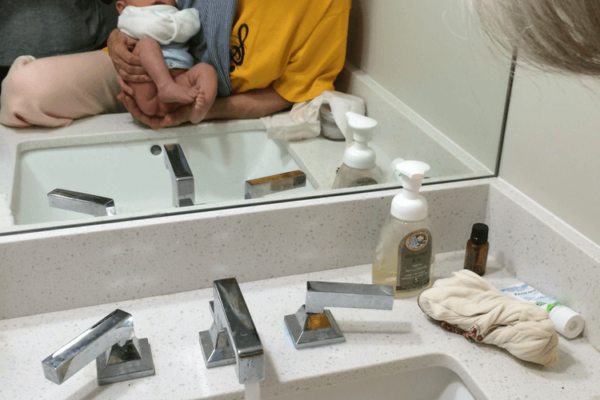5 Things to Know About the Science of Sleep
Here are 5 important things to know about the science of sleep (and how it can help your baby sleep better).

Circadian Rhythm and the suprachiasmatic nucleus
The suprachiasmatic nucleus (SCN) is a small region in the brain’s hypothalamus that rules the body’s internal clock, or circadian pacemaker. It helps regulate the sleep-wake cycle and other daily rhythms, such as hormone release, body temperature, and alertness.
Recommendation
Expose your baby to natural daylight in the morning to help set their body clock for the day. Circadian rhythm does not develop for most babies until about 3 months of age, and does not fully develop until about 12 months of age. For newborns, I recommend sleeping in a bassinet in living spaces with light and noise during their day naps, and keeping night wakes and feeds dimly lit and quiet. This can help them start to get a sense of the difference between night and day.
Melatonin + Cortisol
Melatonin (the sleepy hormone) and cortisol (the stress hormone) play an important role in sleep. Melatonin sets in around 7pm for most babies and children and is an optimal time for sleep. If we miss this sleepy window, a wave of overtiredness (which looks like hyperactivity) causes a cortisol release, which can delay bedtime, and cause for a wildly unpredictable evening (sound familiar?). Most children naturally have enough melatonin and do not need supplements. Not only are the long term effects of supplemental melatonin un-researched and tested for children, they are simply not necessary if you are following your child’s natural sleepy cues.
Recommendation
Start to notice and follow your child’s natural sleepy cues, and aim for a 7-7:30 bedtime. Sleep cues can look different for every child. Some common sleep cues are yawning, disengaging in play, zoning out, red eye brows. Crying is usually the last cue, and is a sign of overtiredness!
Sleep cycles
Infant sleep cycles are short, frequent cycles of about 40 to 60 minutes that include phases of light and deep sleep. At the end of each cycle, it is normal for babies (adults too!) to wake slightly. If your baby feels confident in their ability to go back to sleep on their own, chances are most times you won’t even know they awoke. If your baby is used to you rocking, singing, shushing etc. to sleep, when they wake slightly between sleep cycles, they will want your help again. This can be a common cause of short naps or frequent night wakings.
Recommendation
Give your little one practice falling asleep on their own, by placing them in their crib drowsy, but awake. Being able to fall asleep independently will help your child connect sleep cycles, for more restful sleep (for everyone!).
Impact of light on sleep
Even the smallest amount of light can significantly impact your baby’s SCN (body clock), and disrupt their circadian rhythm. Research shows that the impact of blue and green lights are far more disruptive to melatonin levels than red and orange lights.
Recommendation
For night feedings and diaper changes, you can consider using a red light (you can just put a red bulb in a lamp) or a dim orange light. Many sound machines have a color light setting. I recommended using black out curtains to block out any daylight or early morning light for naps and night sleep. Consider also keeping house lights dim in the evening.
Sleep pressure
Sleep pressure is the build up of awake time between naps, and typically referred to for the stretch between last nap and bedtime. If your child fights bedtime, it could mean they have not built up enough sleep pressure to be able to sleep, even if they seem tired.
Recommendation
Make sure your baby is getting enough time between their last nap and enough wind down time from the day to ensure your child is ready for sleep when bedtime arrives. I recommend a consistent bedtime routine to give your child enough tie to wind down, and also help cue to their brain that it is time for sleep.





Comments